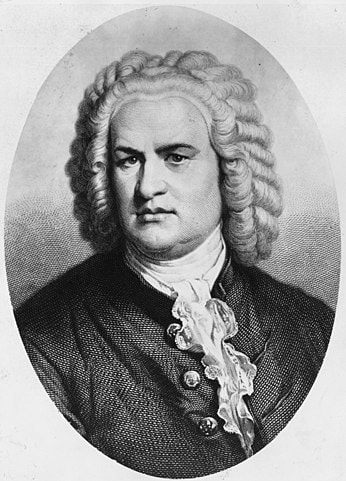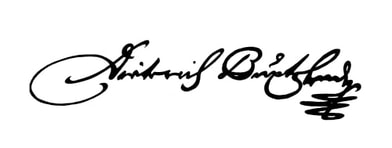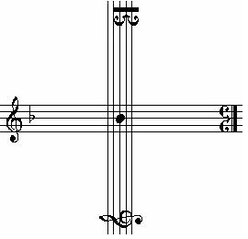 This Sunday is Bach's birthday...or is it? It is not as easy to answer as one would think. However, Bach scholar and Harvard professor Christoph Wolff 's answer to this question posed by Michael Barone, host of "Pipedreams," settles it for me: "Moving Bach's birthday is absolutely ridiculous. True, his life was actually 11 days longer because Protestant Germany adopted the Gregorian calendar in 1700 — but with the legal stipulation that all dates prior to Dec. 31, 1699, remain valid...Hold on to March 21, and feel good about it!" And so we will! This Sunday morning, two works inspired by the very letters of Bach's last name and one by the man himself on the occasion of turning 336. The Bach motif originated with Bach himself as a way of "signing" his name into his compositions and to provide a challenging melodic fragment to compose with. The notes are Bb (in German musical terminology, called B). A, C, and B (called H in German musical terminology.) A respectable number of works have been composed over the centuries to honor Bach in this way including by Johannes Brahms, Franz Liszt, and Arnold Schoenberg. This Sunday, the third fugue in G Minor from Robert Schumann's "Six Fugues on the Name BACH" (1845) will be offered. The Plymouth Ringers play "A Zephyr on B-A-C-H", a work I composed which began with the conspicuous question of, "What would an enchanted windchime, given the chance in a warm breeze and a penchant for Bach, sound like?" Just in case you wondered... The morning service concludes with Bach's "Fantasia in C Major, BWV 570." This uncommon selection in Bach's repertoire has the musical flexibility to be played either quietly and delicately or with bombast and gravitas. We'll go with the latter this week. At the 6:00 p.m. service, songs from the Iona Community will gather us in with a short tribute to Bach as well in Jethro Tull's "Bourée" with flutist Aaron McGrew.
0 Comments
 By Makhstep - Own work, CC BY-SA 4.0, https://commons.wikimedia.org/w/index.php?curid=61346647 By Makhstep - Own work, CC BY-SA 4.0, https://commons.wikimedia.org/w/index.php?curid=61346647 It is unofficially "Baroque Week" at Plymouth beginning this Reformation Sunday and extending into the October 28 Wednesday evening Vespers. Aided by the generous gift of a harpsichord for our chancel (thank you!) and cellist Heidi Mausbach, we'll experience the timeless music of Johann Sebastian Bach: the musical architect of the German Reformation. Bach composed three sonatas for the Viola de Gamba and harpsichord between 1730 and 1740 during his tenure at Thomaskirche, Leipzig. For the Prelude, the lively "Allegro moderato", the fourth and final movement from BWV 1027 in G major, will be offered. Cellist Heidi Mausbach steps in for the hoary Viola de Gamba in this delightfully joyful excerpt. One does not need to be a Bach connoisseur to recognize the Musical Offering this Sunday....just to have attended enough weddings! "Jesus bleibet meine Freude" (Jesus shall remain my joy), famously known as "Jesu, Joy of Man's Desiring," is originally a chorale movement from Cantata 147 "Herz und Mund und Tat und Leben" (Heart and mouth and deed and life). Based on a 1661 hymn tune, this chorale has been heard the world over in arrangements for a variety of instruments, choral settings, and even inclusion in hymnals. On Sunday, soprano Blair Carpenter presents a rendition in German with myself and Heidi accompanying. The works of Bach are revered, studied, and performed by musicians of all kinds. He wrote for everyone including for strings, wind instruments, brass, vocalists, and choirs. Think on the masterworks such as the Brandenburg Concertos, Mass in B Minor, and his numerous cantatas. But it was a special moment for Bach when he could compose for his primary instrument, the organ. The "Fantasia in G Minor, BWV 542" is technically a stand alone work but is often paired with the magnificent Fugue in G Minor. We'll hear the high Baroque drama of the Fantasia a la carte this Sunday....with no small allusion to Halloween as well. If I'm being honest.  By Vanzanten - http://www.documentamusica.de/bilder/buxtehude-unterschrift.png, Public Domain, https://commons.wikimedia.org/w/index.php?curid=17983228 By Vanzanten - http://www.documentamusica.de/bilder/buxtehude-unterschrift.png, Public Domain, https://commons.wikimedia.org/w/index.php?curid=17983228 The organ works of Johann Sebastian Bach can be considered the apex of Baroque composition in their display of masterful counterpoint, virtuosic manual and pedal parts, and genius examples of word painting. But Bach's mentor and acknowledged influence Dietrich Buxtehude offers an illuminating glimpse into what so greatly inspired his wunderkind of a pupil to such great heights. Buxtehude's style was less evolved than Bach's in a sense but did possess a distinct style and passion. We hear three of his works this Sunday morning. An Invocation to the Spirit begins worship with an ornamented chorale prelude setting of "Nun bitten wir den Heiligen Geist" (We Now Implore the Holy Ghost.) This venerable tune and text are based on several sources: stanza one from a 13th century church song based on the Latin hymn to the Spirit, Veni Creator, and additional stanzas written by Martin Luther in 1524. Buxtehude composed two settings of this hymn, both of which will be offered. At the 9:00 a.m. communion, the eucharistic hymn "Jesus Christus unser Heiland" (Jesus Christ Our Savior) will help create a sacred space of sound as we gather around the table. The composer employs a four-part chorale texture ending on an unresolved dominant chord to express the awe and mystery of this ancient sacrament. Lastly, the "Toccata in F Major" brings worship to a thrilling close in a grand display of dramatic Baroque flourishes. At the 11:00 a.m. "choral" service, an intimate yet powerful arrangement of "O God Beyond All Praising" by celebrated composer Dan Forrest will be offered. The melody was originally a central motif from the "Jupiter" movement of Gustav Holst's The Planets. Holst adapted the melody as the hymn tune "Thaxted" (named after the English village he lived most of his life in) for "Songs of Praise", a 1925 compilation assembled in part by his friend Ralph Vaughan Williams. As the tune was often paired with a nationalist text, hymn writer Michael Perry wrote the present words as a "...response to a call for alternative words that would be more appropriate for Christian worship.” Our present day calendars are ten days ahead of the Old Style calendars of Bach's era, making Bach's date of birth March 31 in comparison. And so this Sunday, I'll take the opportunity to pay tribute to this master composer and his influence on generations after him.
Composers such as Franz Liszt and Max Reger offered works in honor of Bach by 'signing' his name into their music using the pitches B, A, C, and H (German indication for B flat). We'll hear Robert Schumann's Fugue No. 3 in G Minor on the Name of BACH and Alice Jordan's Largo on BACH this Sunday morning as two fine entries utilizing this compositional device. Bach's own well-known "Little" Fugue in G Minor, BWV 578 will close the services. Johann Sebastian Bach (1685-1750) will be the organ music focus this Sunday morning as part of the Advent Baroque composer series. The four Advent works of the Orgelbüchlein ("Little Organ Book") will be offered. Composed mostly in Bach's Weimar period from 1708-1717, the collection contains 46 works representing the major feast days of the liturgical year, a small number completed of the 146 planned works. Bach describes the purpose of this collection in his foreword: "In which a beginning organist receives given instruction as to performing a chorale in a multitude of ways while achieving mastery in the study of the pedal, since in the chorales contained herein the pedal is treated entirely obbligato. In honour [sic] of our Lord alone. That my fellow man his skill may hone." The Orgelbüchlein was a pedagogical guide, study in compositional techniques and a religious statement. The four Advent works, BWV 599-602, are Nun komm, der Heiden Heiland (Come now Saviour of heathens), Gottes Sohn ist kommen (The Son of God is come), Herr Christ, der einge Gottes-Sohn (Lord Christ, the only Son of God), and Lob sei dem allmächtigen Gott (Praise be to God Almighty).
At the 11:00 a.m. service, the Chancel Choir will sing composer Robert Hobby's setting of the Charles Wesley Advent hymn, Come, Thou Long-Expected Jesus. The text is set to the tune JEFFERSON from the 1835 early American shape note and song book, Southern Harmony. Amy Welsh will conduct. At 6:00 p.m. the annual Longest Night service will include harpist Alaina Bongers, flutist Rebecca Quillen, the Plymouth Ringers, and our newest ensemble, the Chamber Choir. Advent selections include an arrangement of the 16th century plainsong chant Divinum Mysterium by Alaina Bongers and the Anglican choral classic A Spotless Rose by Herbert Howells. |
Details
|



 RSS Feed
RSS Feed